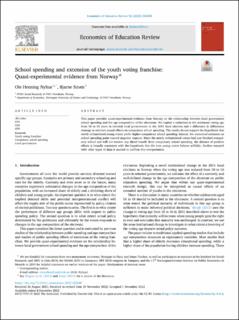School spending and extension of the youth voting franchise: Quasi-experimental evidence from Norway
Peer reviewed, Journal article
Published version

Permanent lenke
https://hdl.handle.net/11250/3050713Utgivelsesdato
2022Metadata
Vis full innførselSamlinger
- Institutt for samfunnsøkonomi [1170]
- Publikasjoner fra CRIStin - NTNU [38289]
Originalversjon
10.1016/j.econedurev.2022.102348Sammendrag
This paper provides quasi-experimental evidence from Norway on the relationship between local government school spending and the age composition of the electorate. We exploit a reduction in the minimum voting age from 18 to 16 years in selected local governments in the 2011 local election and a difference in differences strategy to estimate causal effects on compulsory school spending. The results do not support the hypothesis that newly enfranchised young voters prefer higher compulsory school spending. Instead, the numerical estimates on school spending point toward negative impacts. Since the newly enfranchised voters had just finished compulsory school and will not receive any direct benefit from compulsory school spending, the absence of positive effects is broadly consistent with the hypothesis that the new young voters behave selfishly. Further research with other types of data is needed to confirm this interpretation. School spending and extension of the youth voting franchise: Quasi-experimental evidence from Norway
